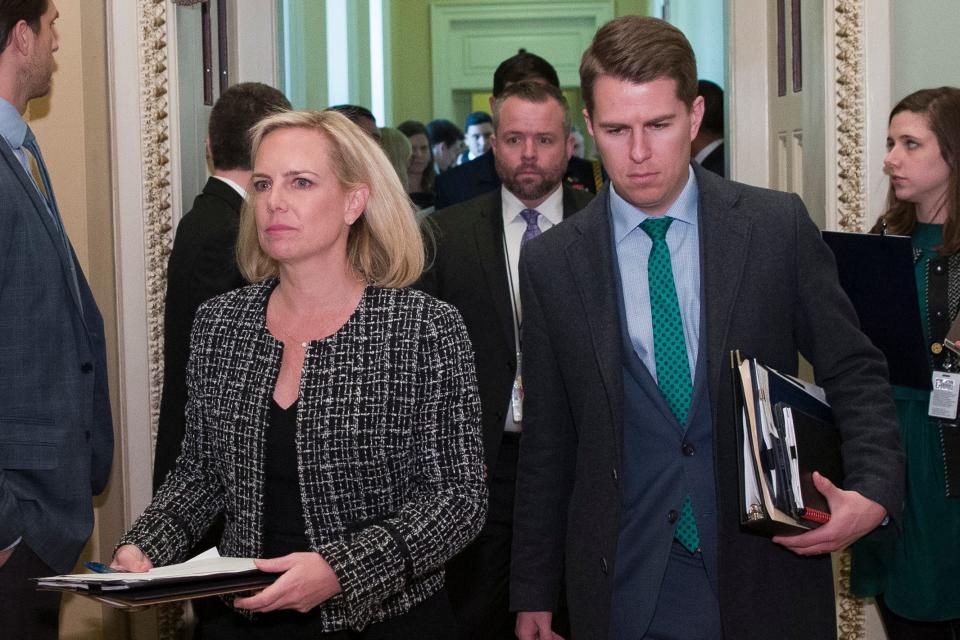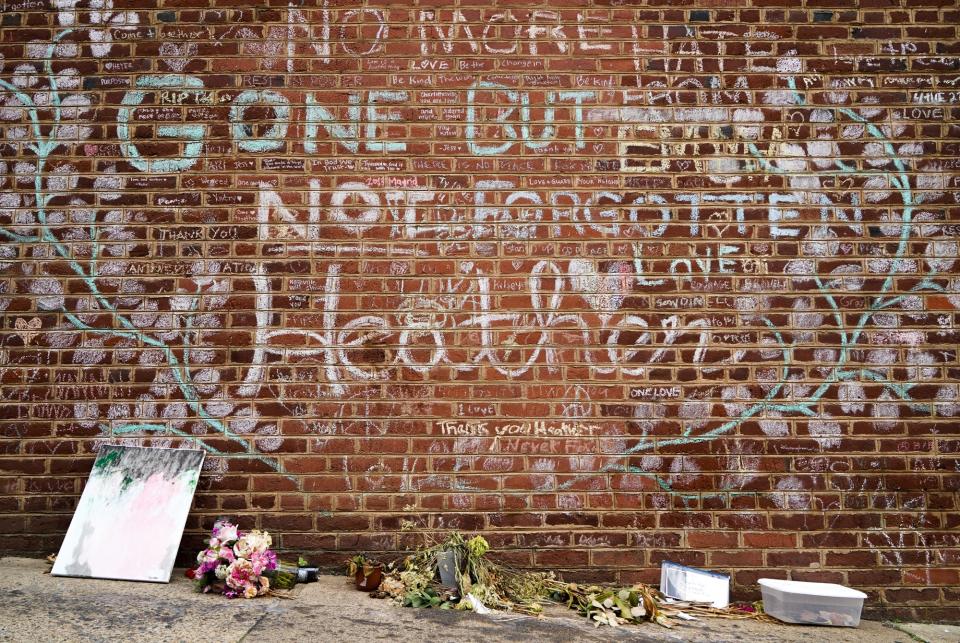After years of denial under President Trump, experts expect Joe Biden to confront domestic extremism

For four years, President Donald Trump downplayed homegrown extremism, refused to engage in security briefings and peddled in falsehoods about threats from leftists. Now former federal security officials are urging President-elect Joe Biden to more seriously acknowledge the growing danger of domestic terrorism, and they welcome signs that he plans to do so.
"Just the fact that Biden's going to run a normal process, that alone will make us safer because you'll actually have people paying attention and addressing these issues," said Elizabeth Neumann, a former senior Homeland Security official.
"The indications are that he's going to treat the challenges we have with domestic terrorism seriously."
Neumann was one of a half-dozen former U.S. Department of Homeland Security sources interviewed, along with members of other federal law enforcement agencies and experts in domestic terrorism.
Their consensus was that the past four years have been chaotic at the upper echelon of national security. Trump has consistently downplayed a spike in homegrown extremism – most of it from the far right – that his own words have helped grow, they said.
QAnon and other dark forces: How they are radicalizing Americans as the COVID-19 pandemic rages

“I can say, unequivocally, when it comes to the issue of domestic terrorism, this White House was completely out to lunch,” said Miles Taylor, a Trump appointee who served as chief of staff to the former head of the Department of Homeland Security and who wrote anonymous critiques of the Trump administration. “That warped perspective essentially held back administration policy on the issue of domestic terrorism so significantly that I believe it has lost American lives.”
Who is Miles Taylor? 'Anonymous' author was known for working on Donald Trump's immigration policies.
In response to a request for comment from the White House, National Security Council spokesman John Ullyot emailed a statement: “There is nothing more important to this president than protecting the U.S. from all threats, both foreign and domestic, and he has repeatedly taken strong actions to keep America safe.”

Biden, who launched his campaign in the wake of the 2017 far-right rally in Charlottesville, Virginia, has indicated he will focus on domestic terrorism and homegrown extremism. During the campaign, Biden often alluded to violence and intimidation by extremist groups. During a debate in September, he pressed Trump to repudiate the extremist organization the Proud Boys.
While Biden’s blueprint for tackling domestic extremism is unclear, there are signs he will prioritize the issue. A “Plan to End Our Gun Violence Epidemic” on the president-elect’s website includes a promise to “Establish a new Task Force on Online Harassment and Abuse to focus on the connection between mass shootings, online harassment, extremism, and violence against women.”
Biden's transition team declined to comment for this story.
Experts on extremism and former security officials have a host of suggestions for how Biden could reset the federal response to homegrown extremism. Several former officials suggested creating a new task force made up of subject matter experts and security officials, specifically directed at the domestic terror threat.
Javed Ali, senior director for counterterrorism on the National Security Council in 2017 and 2018, said Biden could set up a commission similar to the 9/11 Commission to study the specter of homegrown extremism and plot a course forward.
More than anything, what is needed is a change in attitude from the White House on the subject, multiple sources said.
"I have no doubt that the Biden administration will take a really aggressive approach to this problem from early on," Taylor said. "People will still die, but that doesn't mean we can't right the ship."
A growing threat amid 'utter chaos'
Homegrown, violent extremism is as old as the republic. But the past four years have seen a spike in violence from white nationalists, neo-Nazis and other far-right extremists.
An October study by the Center for Strategic & International Studies found that two-thirds of the terrorist plots and attacks in the United States in the first eight months of 2020 were carried out by white supremacists and like-minded extremists.
Since Trump took office, far-right groups have accounted for a significant majority of terror attacks and plots, according to an analysis by Reveal from the Center for Investigative Reporting and Type Investigations.
Inside the federal government, the trends haven't gone unnoticed.
Russ Travers, who was acting director of the National Counterterrorism Center from 2017 to March 2020, said that by 2018 he and his analysts were growing alarmed about the threat.
"It was one of my major initiatives," Travers said. "I thought that my center should be involved in watching this growing, right-wing domestic terrorism."
Intelligence from agencies like the counterterrorism center was instrumental in informing the priorities of the Department of Homeland Security, and Neumann, Taylor and other homeland security sources said they tried to elevate the importance of threats from white supremacists and other domestic terrorists.
That push was stymied at almost every turn, Taylor said.
"The last four years were a huge missed opportunity," he said. "The White House never mounted a 'whole of government' effort to go after the threat, and that's exactly what was needed."
Neumann said the roadblocks came in two forms: a reluctance by the White House to even talk about white nationalism and far-right terrorism as a real threat, and a lack of engagement from Trump himself, who couldn't stay focused in meetings (when he showed up) and wouldn't make crucial decisions that would help push counterterrorism initiatives forward.
Neumann said the nitty-gritty of counterterrorism work at the Department of Homeland Security involves choosing how to allocate resources or personnel to track and investigate different terror threats. Under Trump, she said, it was hard to know what to prioritize because there was so little clear direction from the president.
"The Trump effect was utter chaos in the White House," Neumann said. "And the impact is that you can have junior-level people assert that they have had a conversation with the president and he wants to go in 'X' direction, but someone else will say, 'But he told me he wants to go in this direction.' So you end up with this weird infighting where everything is unclear."
Brette Steele, who was regional director of strategic engagement for DHS's Security Office of Terrorism Prevention Partnerships, laid out an example of crucial work stagnating because of a lack of engagement from Trump.
Steele used to sit on the Countering Violent Extremism Task Force, a group that aims to prevent people from getting involved with extremist organizations by working with communities and law enforcement. When she left the task force in 2017, nobody was ever appointed to take her place, Steele said. This happened again and again as task force members termed out, she said, and it indicated the administration's lack of commitment to fighting domestic terrorism.
"When I testified on this last summer at the House Oversight Committee, they thought the task force had been abolished," Steele said. "It hadn't; it just didn't have any staff. Nobody tried to kill it per se, but it just wasn’t replenished."
'Still a lot of good work happening'
While political appointees who were involved in shaping security policy expressed the most frustration with the Trump administration, other former homeland security officials said they were largely left alone to do their work, despite the rhetoric coming out of the White House.
"At the career level, there was still a lot of good work happening, and no political interference," Steele said.
Javed Ali, the official who served as the senior director for counterterrorism on the National Security Council in 2017 and 2018, concurred. Like most of his contemporaries in national security, Ali said he saw homegrown extremism connected to white nationalism growing significantly in the early years of Trump's presidency.
"We realized, 'We've got to get our hands around this,'" Ali said. "But I push back on the idea that we were discouraged from concentrating on domestic terrorism. At the FBI, that's what we were increasingly focused on."
But that shifting focus seems to have been largely lost on the White House.
The 2018 White House National Counterterrorism Strategy, the blueprint for domestic security, contains only two sentences about domestic terrorism. Taylor said that was in spite of him and then-Homeland Security chief Kirstjen Nielsen fighting for months for the document to have a strong emphasis on the growing threat of homegrown extremism.
"They basically struck everything having to do with domestic terrorism," Taylor said. "We had focused probably one-third of the document on the domestic terrorism threat, because that's roughly what our analysts were telling us. The White House took it from one-third to a 99% focus on international terrorism and 1% on domestic terrorism."
Lowering the temperature
Many experts on domestic extremism are united on one point: Trump hasn't just overseen a rise in homegrown extremism, he has actively encouraged it.
Trump's bombastic tweets, his willingness to spread falsehoods about threats of wide-scale domestic terrorism from anti-fascists and his dire warnings about immigration have all served to whip up troubled people who resort to terrorist violence, those experts said.
As such, a lot depends on how Trump comports himself in the coming months and years. If he continues to contest the election results and spends the next four years campaigning on the basis of hate-fueled lies, we can expect to see increased domestic terrorist activity, said Travers, former acting director of the National Counterterrorism Center.
"The political temperature of the rhetoric has got to come down," Travers said. "There’s a lot of angry people out there, and a lot of them have guns."
This article originally appeared on USA TODAY: Domestic extremism: Unlike Trump, Joe Biden expected to take action